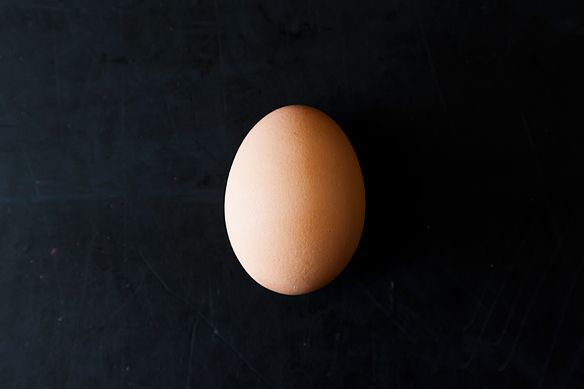Popular on Food52
17 Comments
Eric
May 16, 2023
My go-to bread recipe calls for two large eggs, which (after I break them into the bowl) typically weigh anywhere from 93-98 grams. With egg prices currently high, the best deal I found happens to be on jumbos (for whatever reason half the price of large). I scramble two of them, pour 95g into the dough and use the rest for an egg wash after diluting with water.
Lesley C.
November 1, 2020
I get fresh organic eggs from the farm. They run from 65g to over 100g in the shell. Any over about 80g are double yolked. Just for fun (and precision), I weigh each egg as it comes in. I have weighed the contents—together and separately—of dozens of eggs to get a standard of use. I chart the weights against supermarket Grade AA large weights of yolks, whites and the whole egg. With these baseline weights, there is no guesswork that can ruin a recipe. If I need whole eggs, I mix up what comes very close to the total weight I need. I mix them with a large fork to break up the whites so the whites don’t slip through in a blob. I measure out what I need. If there are any left, I scramble ‘em up and have a little egg snack. Too many or too few eggs really can ruin the texture of a recipe. As a science major, this really gs been fun for me!
LM
May 24, 2018
When did this standard start? What if your recipe is almost 100 years old? Just says 3 eggs.
JVineyard
June 30, 2013
Thank you for this information. I buy fresh eggs and the size varies by time of year and age of chickens. I was stumped when baking. What great info.
maryw.s.
June 30, 2013
I eat an soft fried egg every day, so I buy jumbo, organic brown eggs for eating and smaller, regular-grocery eggs for baking. The jumbo eggs seem much too big for baking, and I have good results with large or extra-large eggs.
darksideofthespoon
June 30, 2013
I always go by 20g for the yolk, 30g for the white, 50g for the whole egg.
paseo
June 30, 2013
I do the same, but so few recipes published in the US are by weight - which makes things so much easier.
AbundantAnne
June 29, 2013
I just baked a 6 egg cake and used 1 duck egg and 5 generous sized chicken eggs and my cake fell! Not horribly but not up to standard either. It tasted great however. Do you think this is because of the eggs, or could it be the organic sugar (evaporated cane juice) with slightly larger crystals. I run the sugar through the food processor to make the crystals smaller... thoughts eggs vs sugar?
Lindsay-Jean H.
June 29, 2013
boulangere goes through a couple of potential causes for a cake falling in this Hotline thread: http://food52.com/hotline/20388-cake-fell-can-you-put-cool-cake-back-in-the-oven
boulangere
June 29, 2013
AbundantAnne, I have a feeling that your cake was heavy on the egg end of things. First, let me tell you how envious I am that you have access to duck eggs. I love them, especially that gorgeous meaty yolk. Duck eggs (minus the shell) range from 2.3 to 2.5 ounces in liquid volume or physical weight, which for eggs are identical (see thread below). You needed a total of about 10 ounces of eggs, and I have a feeling you exceeded that by a fair amount, making your cake too heavy. No knowing the rest of your recipe or its method, I'm thinking that your leavening may not have been sufficient to literally lift a heavier set of ingredients.
boulangere
June 29, 2013
I should clarify that the average of 1.66 ounces refers to the egg without its shell. Thanks!
Greenstuff
June 29, 2013
And just to be clear--I think that the standard for large eggs is that the minimum weight for a dozen is 24 ounces for a dozen in the shell? They could be up to 27 ounces/dozen (the minimum for extra large)and still be considered large. The standards don't consider the shell-less weight, right? Is the 1.66 (or 1 2/3) just an average you've found useful?
And even more important, can you help make sure no one thinks they need a scale that reads to the hundreths of an ounce? I can imagine thinking 50 grams/egg would be a useful amount to remember, but not 1.66 oz. or 47 g.
And even more important, can you help make sure no one thinks they need a scale that reads to the hundreths of an ounce? I can imagine thinking 50 grams/egg would be a useful amount to remember, but not 1.66 oz. or 47 g.
boulangere
June 29, 2013
The shell weight is irrelevant because we are talking about eggs as they pertain to baking. The average weight of a Grade A or AA Large as 1.66 ounces (without shell, of course) is both a genuine average for commercial eggs, and extremely useful to know. Eggs, be they whole (but without the shell), white only (1 ounce) or yolk (.66 ounce) can be measured using a liquid measuring cup which is graduated in ounces.
To explain a bit further, lets imagine you are making AbundantAnne's 6-egg cake. All baking recipes, whether they so inform you or not, are predicated upon Grade A or AA Large eggs, which weigh on average (minus the shell) 1.66 ounces. For purposes of ingredients which contain large amounts of water, such as eggs, physical weight and liquid volume are considered equal: 1.66 ounces in a liquid measuring cup or on a scale. The total weight/volume of eggs she needs is 6 x 1.66, or 9.96 ounces of eggs. Round up and call it 10 ounces. If she were using commercial eggs, even organic commercial eggs, she could trust that if she cracked open 6 eggs, she'd be fine. But she used a combination of different eggs; therefore, the most reliable way to do that would be to crack them into a liquid measuring cup until they reach 10 ounces.
To explain a bit further, lets imagine you are making AbundantAnne's 6-egg cake. All baking recipes, whether they so inform you or not, are predicated upon Grade A or AA Large eggs, which weigh on average (minus the shell) 1.66 ounces. For purposes of ingredients which contain large amounts of water, such as eggs, physical weight and liquid volume are considered equal: 1.66 ounces in a liquid measuring cup or on a scale. The total weight/volume of eggs she needs is 6 x 1.66, or 9.96 ounces of eggs. Round up and call it 10 ounces. If she were using commercial eggs, even organic commercial eggs, she could trust that if she cracked open 6 eggs, she'd be fine. But she used a combination of different eggs; therefore, the most reliable way to do that would be to crack them into a liquid measuring cup until they reach 10 ounces.
thirschfeld
June 30, 2013
If I am not mistaken the yolk in any medium or large egg is .66 ounces and it is the white that varies in size. I know in peewee and small it is a different weight not sure about jumbo. I have also observed what appears to be stronger protein strands of protein in the eggs I raise compared to store bought. If I am using duck eggs, which really do have a different protein structure, I can sub 3 duck eggs for 4 chicken eggs.
boulangere
June 30, 2013
That's been my experience, too, Tom, with farm eggs. I honestly do not know what role nutrition plays in the quality of whites, but age has everything to do with it. When you're working with an egg that came from hen a few hours ago, the white is going to be much stronger than that from an egg that came from who knows where who knows when. I honestly have no idea if nutrition has any bearing on the difference; what are your thoughts on the subject?


See what other Food52 readers are saying.